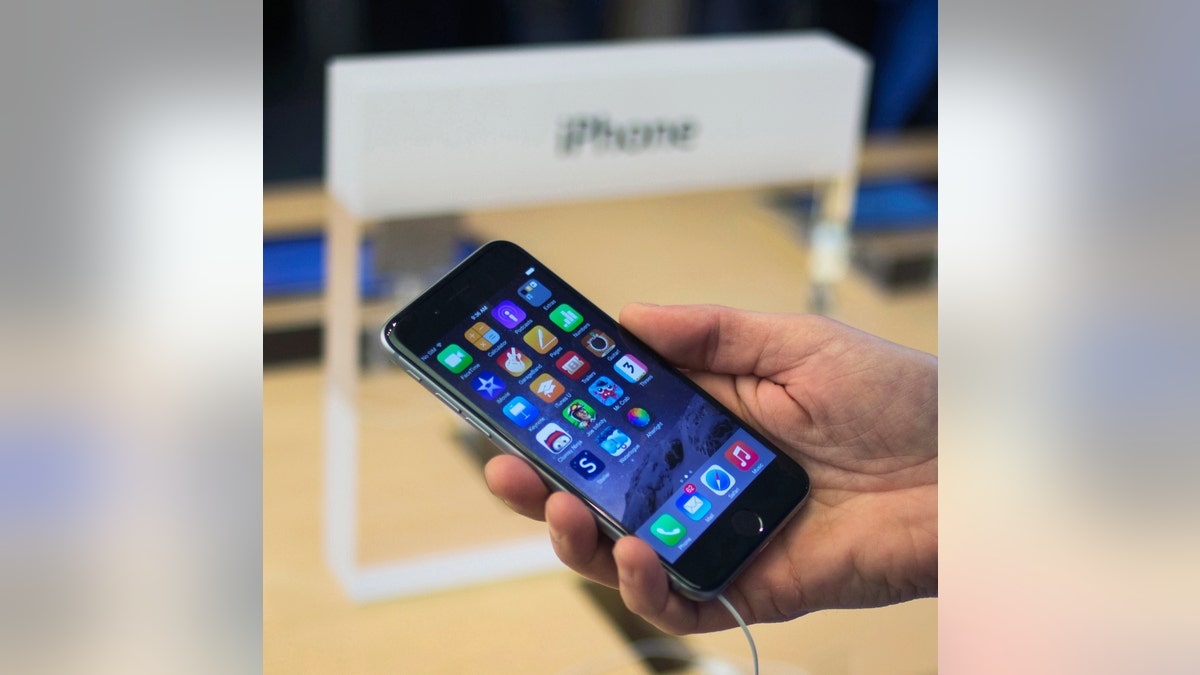
File photo - A customer holds an iPhone 6 on display at the Fifth Avenue Apple store on the first day of sales in Manhattan, New York Sept. 19, 2014. (REUTERS/Adrees Latif)
Just as the Bureau of Land Management “manages” much federal land, the National Telecommunication and Information Association “manages” federal spectrum, and the Federal Communications Commission “manages” the commercial use of spectrum, and they do not manage it well.
In a recent speech to the tech community, 2016 Republican presidential candidate, Florida Senator Marco Rubio emphasized that spectrum is “the highway for the digital age” that will drive our economy. The small amount of spectrum that is licensed for commercially is valued at $500 billion dollars and generates between $5 trillion and $10 trillion in consumer surplus.
Spectrum delivers our wireless communications, like broadcast television, AM/FM radio, WiFi and smartphone traffic, through the air. Our ever-increasing consumption of wireless data coupled with spectrum scarcity, makes it a cherished resource for companies that want to deliver wireless services.
According to CTIA, the Wireless Association, “while mobile data traffic in 2019 is projected to be six times what it was last year, we will not have six times the spectrum available to support that traffic.”
The spectrum crunch is real. The FCC has auctioned less than half of the 300 MHz it said was needed by 2015. The FCC’s own data traffic estimate accurately predicted data traffic in 2014, but it is not keeping up and federal agencies have no incentive to help.
Only 30 percent of “beachfront” spectrum bands are available exclusively to industry. That means there is about another 80 percent of quality spectrum unavailable for commercial use.
We need to more spectrum to market. There are plenty of buyers. The feds need an incentive.
Where is all the spectrum going? To government agencies. Surprise.
The economic value of the 645.5 Mhz of commercially licensed spectrum is valued at nearly $500 billion, reports the Brattle Group. This is an opportunity for the government to meet budget “shortfalls” without hammering taxpayers.
In order to realize these benefits two federal agencies need to clean some attics and hold a yard sale. The National Telecommunications and Information Administration, which manages federal spectrum use, must restructure and reclaim under-used spectrum -- “clean the attic.” Then let the Federal Communications Commission manage the commercial auctions -- “host the yard sale.”
The fed, of course, does not want to part ways with its gold, especially since this particular asset doesn’t have to show up on the balance sheet. That’s right: one of the most valuable limited resources we have, federal agencies do not have to account for in their budgets or report how they are using it.
Hard to believe, but in up until the 90s even commercial spectrum was awarded via lotteries and “comparative hearings,” commonly called “beauty pageants.”
We need to more spectrum to market. There are plenty of buyers. The feds need an incentive. Senator Rubio has the carrot/stick.
In the recently reintroduced the Wireless Innovation Act, S. 1618, the NTIA would determine the commercial value of federal spectrum and require that agencies report it as part of their budget costs. Spectrum would no longer be a hidden asset. If an agency keeps it, it is a cost. But if an agency “sells” spectrum, is it a gain? It should be.
While it isn’t in this bill, this is an opportunity for agencies, particularly the Department of Defense, to sell off underused resources to fund their agencies. If agencies had the ability to sell or share spectrum under their purview, we would see it come to market.
More spectrum on the market benefits Americans twofold. The “profits” should be used to reduce tax burdens and/or debt, and with more spectrum in market hands, Americans get more of the wireless services and innovations that they love.
Hard to believe, but in up until the 90s even commercial spectrum was awarded via lotteries and “comparative hearings,” commonly called “beauty pageants.” After all of the ineffective arbitrary awards, the 90s brought spectrum to the free-market via auctions rather than gifting it to the politically connected.
The FCC has held nearly 100 spectrum auctions that have raised over $100 billion to date. The FCC’s first large scale spectrum auction – Auction 4 – ended in March 1995, and netted $7 billion for two 15 Mhz blocks of spectrum known as Blocks A and B. A year later, in Auction 5, the agency netted $10 billion for the 30-Mhz C-block.
The most recent auction raised nearly $45 billion.
If only one-quarter of government spectrum could be reclaimed and sold off, the government could plausibly raise between $100 billion and $200 billion. Not chicken feed.








































